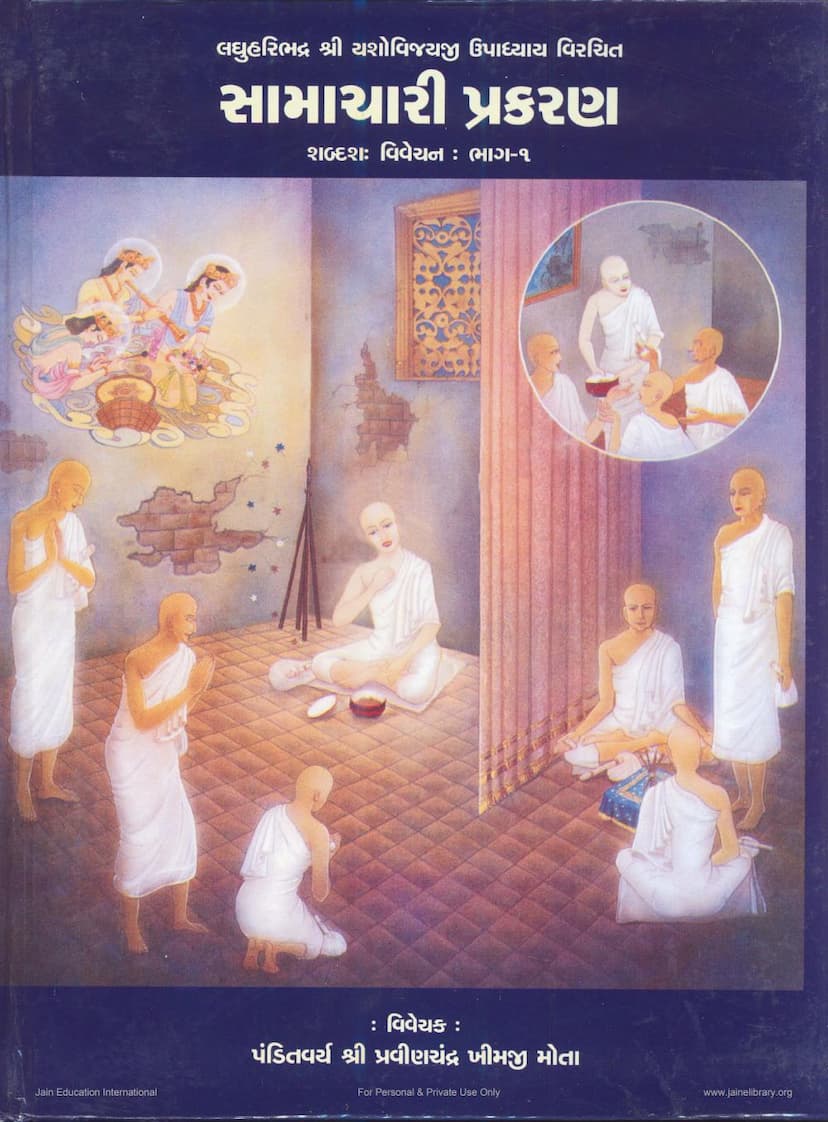Samachari Prakaran Part 01
Added to library: September 2, 2025

Summary
Here's a comprehensive summary of the Jain text "Samachari Prakaran Part 01" based on the provided pages:
Title: Samachari Prakaran Part 01 (Meaning: Chapter on Conduct/Discipline, Part 1)
Author: Pravinchandra K Mota (Commentator/Analyst)
Original Text Author: Laghu Haribhadra Suri, Mahamahopadhyaya Shrimad Yashovijayji Maharaj (as per page 2, the original author and commentator)
Publisher: Gitarth Ganga
Overview:
This book, "Samachari Prakaran Part 01," is a detailed commentary and analysis by Panditvarya Shri Pravinchandra K. Mota on the original work "Samachari Prakaran" authored by the esteemed Jain scholar Shrimad Yashovijayji Maharaj. The publication is a testament to the Gitarth Ganga trust's commitment to illuminating the profound teachings of ancient Jain scholars for the benefit of the Jain community. The book aims to provide a deep understanding of the principles of conduct and discipline prescribed for Jain ascetics.
Key Themes and Content:
-
The Importance of Samachari: The text emphasizes that Samachari (proper conduct and discipline) is the lifeblood of an ascetic's life. Without adhering to Samachari, the essence of asceticism (sanyam) is lost. The text highlights that adherence to Samachari helps in eradicating passions like attachment and aversion, leading to liberation.
-
Commentary Style: The commentary is a "word-for-word analysis" (Shabdshah Vivechan), indicating a meticulous and detailed explanation of the original text. The commentator, Panditvarya Shri Pravinchandra K. Mota, is lauded for his insightful and clear explanations, making complex concepts accessible.
-
The Original Text: The original "Samachari Prakaran" by Shrimad Yashovijayji Maharaj is described as a profound work, elucidated by his own commentary. Yashovijayji Maharaj, a highly accomplished scholar and poet, is recognized for his extensive and clear writings on various aspects of Jain philosophy, including Logic (Nyaya), Agamas, Yoga, Devotion (Bhakti), and Conduct (Achara). His works are considered authoritative and universally accepted.
-
The Concept of Samachari: The text defines Samachari as the framework of conduct for monks and nuns, established by the Tirthankaras. It is primarily divided into three types:
- Ogha Samachari: Daily duties and proper actions like padilehan (inspecting one's belongings for living beings).
- Dashavidha Samachari: Ten specific types of conduct, including Ichhakara, Michhakara, etc., which are a central focus of this work.
- Padavibhaga Samachari: The distinction between general rules (utsarga) and exceptions (apavada). The current volume (Part 1) focuses on the Dashavidha Samachari, specifically elaborating on Ichhakara and Michhakara, and other aspects are expected in Part 2.
-
Core Principles Explained: The commentary delves into specific Samacharis with meticulous detail. For instance, Ichhakara (seeking voluntary consent) is explained in terms of its application when a monk needs someone else to perform an action for them, ensuring the other person acts willingly, thus avoiding karmic bondage and promoting merit. Michhakara (seeking forgiveness/repentance) is explained as a crucial practice for purifying faults and maintaining pure conduct. The text also clarifies the philosophical nuances of concepts like tathakara (affirmation of agreement) and aavashyaki (necessary actions), explaining their purpose and application within the framework of Jain conduct.
-
The Role of Nayas (Perspectives): The text discusses the importance of different nayasa (philosophical viewpoints) like Nishchaya (absolute truth) and Vyavahar (conventional truth) in understanding Samachari. This approach helps in appreciating the multifaceted nature of these principles.
-
Guidance for Practice: The commentary emphasizes that Samachari is not just theoretical knowledge but a practical guide for daily life. It stresses the importance of constant introspection, adherence to prescribed practices, and seeking guidance from enlightened gurus.
-
The Goal of Samachari: Ultimately, the text presents Samachari as a vital path for spiritual growth, leading to the attainment of right knowledge, right faith, and right conduct, which are instrumental in achieving liberation (moksha).
-
Acknowledgement of Mentors: The commentator, Shri Pravinchandra K. Mota, expresses deep gratitude to his spiritual mentors and those who guided him in his pursuit of knowledge, highlighting the importance of a Guru-disciple lineage in preserving and transmitting Jain wisdom.
-
Publisher's Vision: The Gitarth Ganga trust's vision is to make the profound teachings of revered scholars like Haribhadrasuri and Yashovijayji accessible through analytical commentaries, aiding the Jain community in holistic spiritual understanding.
In essence, "Samachari Prakaran Part 01" serves as a profound and scholarly exploration of the foundational conduct principles for Jain ascetics, authored by a revered tradition of Jain scholars and presented with clarity and depth by Panditvarya Shri Pravinchandra K. Mota.